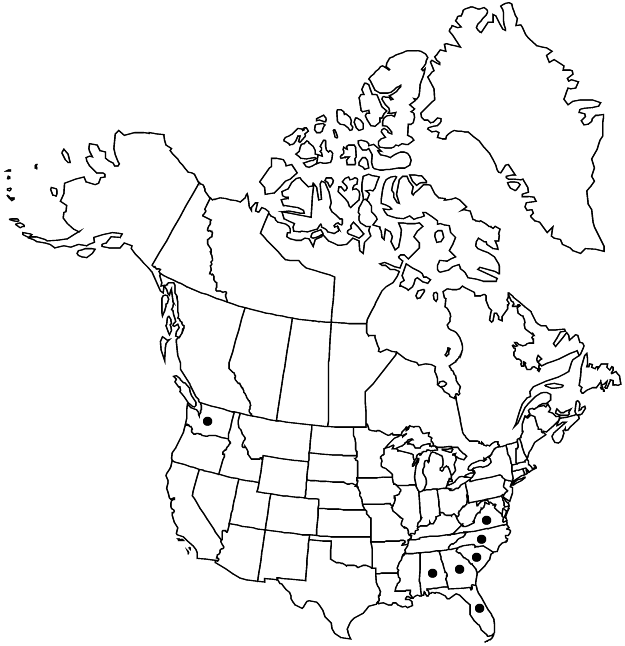Sarracenia flava
Sp. Pl. 1: 510. 1753 ,.
Plants forming dense clumps; rhizomes 1–2.5 cm diam. Pitchers marcescent, appearing after the first flowers, producing 1 flush of pitchers in spring through early summer, erect, yellowish green throughout, often with dark red blotches on neck, dark red veins on distal portions of tube and hood, or whole tube heavily suffused bronze or purplish red, without white areolae, 25–90(–100) cm, thick, firm, surfaces glabrous, wings 0.5–1(–2) cm wide; orifice broadly ovate, 2–7(–8) cm diam., rim green, flaring and loosely revolute, often with prominent, everted indentation immediately distal to wing forming spout over wing; hood recurved adaxially, held well beyond and covering orifice, yellow-green, red-veined or suffused with bronze-red, without white areolae, orbiculate-reniform, not undulate, 3–10 × (3–)5–14 cm, ± as long as wide, proximal margins broadly cordate, opposite lobes reflexed abaxially, touching or nearly touching, neck (often red-blotched or red-veined), constricted, 1–3 cm, margins revolute, apiculum (2–)3–12(–18) mm, adaxial surface glabrous. Phyllodia 2–4(–5), erect, oblanciform, (8–)12–30 × 1–3 cm. Scapes 15–60 cm, shorter than pitchers; bracts 1–2 cm. Flowers strongly ill-scented; sepals yellowish green, 3–5 × 2–3.5 cm; petals yellow, distal portion ovate to narrowly elliptic, 5–8.5 × 3–4 cm, margins entire; style disc yellow-green, 6–8 cm diam. Capsules 1.4–2 cm diam. Seeds 1.8–2.5 mm. 2n = 26.
Phenology: Flowering Mar–Apr.
Habitat: Wet pine savannas and flatwoods, peat-based Carolina bays, pond-cypress swamps, bogs, pineland seepage slopes, streamhead ecotones, baygalls, titi thickets
Elevation: 0-300 m
Distribution

Ala., Fla., Ga., N.C., S.C., Va., Wash.
Discussion
Sarracenia flava ranges from the southeastern coastal plain of Virginia and isolated piedmont localities in North Carolina through the coastal plain of North Carolina, South Carolina, Georgia, and the western Florida panhandle mostly near and west of the Ochlockonee River and west just into southeastern Alabama, with isolated sites in northeastern Florida. It is naturalized in Skagit County, Washington.
Sarracenia flava is a striking plant, often forming large stands, at least historically. It is much less common with the advent of drainage and changing land use. It has one main flush of pitchers in spring to early summer. It is quite variable over its range with regard to vein patterns and markings on the pitchers, and at least seven varieties have been formally named (see D. E. Schnell 2002).
Selected References
None.
